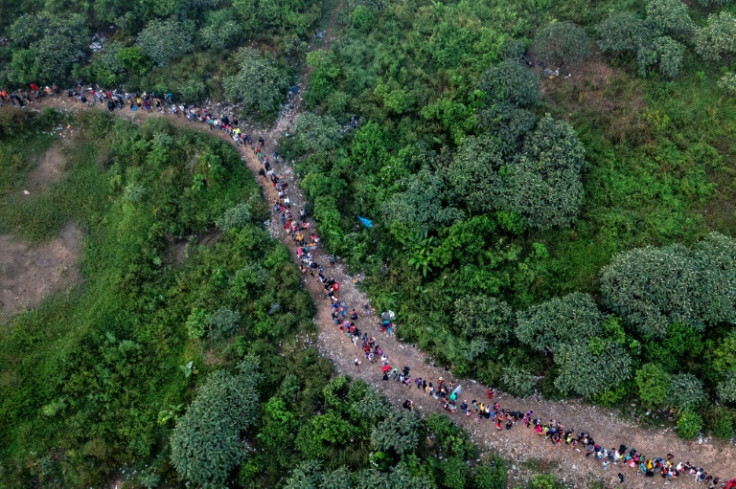
A growing number of migrants are accusing members of Mexico's Border Patrol of sexual abuse and theft at the moment of getting apprehended close to the border the country shares with the United States.
Several of them told Border Report that they were recently subjected to sexual abuse as they attempted to cross into the U.S. through the mountains east of San Diego. They said they were also robbed, being asked for $2,500 per person and told that they would have to work to access the border.
A group of Peruvian migrants recounted a similar situation, where they were asked for $800 per person by Border Patrol agents and, when they told them they couldn't reach said amount, being robbed of their cellphones, watches, jewelry and even shoes.
The outlet also recalled that, earlier this year, the head of Baja California's Lawyers Bar Association said members of Mexico's National Guard are accused of human rights and civil rights violations more than any other police agency in the state.
The stories come as migrants face increasingly daunting challenges when attempting to reach the United States. Last week, Human Rights Watch said that Colombia and Panama were failing to protect those crossing the Darien Gap, a treacherous jungle path connecting South and Central America that has become a highly-transited route for migrants in the past years.
In a 110-page report called "Neglected in the Jungle: Inadequate Protection and Assistance for Migrants and Asylum Seekers Crossing the Darién Gap," the agency said that it found evidence of "serious abuses."
"Crimes against migrants and asylum seekers in the Darién Gap, including pervasive cases of sexual violence, go largely uninvestigated and unpunished on both sides of the border. Accountability for these abuses is rare due to a combination of limited resources and personnel, a lack of a criminal investigation strategy for these cases, and poor coordination between Colombian and Panamanian authorities," reads a passage of the study.

"During their journey through this difficult terrain, Venezuelans, Haitians, and Ecuadorians, as well as people from Asia and Africa, have experienced serious abuses, including sexual violence. Dozens, if not hundreds, have lost their lives trying to cross or are missing. While the International Organization for Migration reported that 245 have disappeared between 2021 and March 2023, the real figure is likely to be much higher," the report adds.
The increasingly dire situation at different points of the journey may have taken a toll on migrants, as the amount of apprehensions at the the U.S. southern border surprisingly fell in March, CBS News reported.
Concretely, Border Patrol agents encountered over 137,000 people crossing the border unlawfully during the period. Even though it's a dip compared to February's 141,000, the figure becomes more significant as seasonal trends pointed at a surge during the period.
In fact, the outlet reported that it's the first time in seven years and the only one during the Biden administration when apprehensions fall from February to March. They had spiked by at least 33,000 people, according to CBP statistics.
Enforcement by Mexican authorities is seemingly playing a large role. Asides from the illegal actions recounted by migrants to Border Report, a recent report by AP highlighted that Venezuelan migrants attempting to reach the U.S. are increasingly getting stuck in Mexico unable to continue their journey and with no perspective to do so in the near future.
Efforts by the Andrés Manuel López Obrador (commonly known as AMLO) administration are aimed at keeping migrants closer to its southern border, which it shares with Guatemala. They include forcing people from trains and flying and busing them back south. Some have even been flown to Venezuela.
© 2024 Latin Times. All rights reserved. Do not reproduce without permission.
Millions of Latinos likely to struggle with internet payments as subsidy program runs out of money
Latino Catholics are nearly evenly split in their support for Biden and Trump
Arizona Democrats garner enough votes to repeal 19th-century law banning most abortions
Colombian President Petro announces country will sever diplomatic ties with Israel amid Gaza conflict
